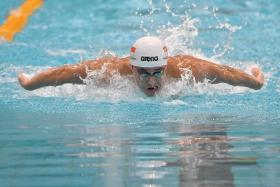Coach Lopez wants multi-stroke swimmers
For a nation that traditionally excels in the region in swimming's sprint events, it is natural to have a big group of Singapore athletes competing in the 50 metres and 100m, especially in freestyle.
But in the three-day Singapura Finance 47th Singapore National Age-Group (Snag) Swimming Championships (Junior) last week, the 200m individual medley (IM) was one of the most well-participated events at the OCBC Aquatic Centre.
There were 493 entries across both genders for the 50m free, 373 names for the 100m free and 370 for the 200 IM - swimmers are required to swim 50m in each of the four strokes - freestyle, backstroke, butterfly and breaststroke.
Since last year's Snag, the Singapore Swimming Association (SSA) has made it compulsory for swimmers aged 11 and 12 to compete in the 200 IM.
National coach Sergio Lopez said: "It is done to make sure that the kids are not one-track... there's so much focus in the clubs, schools and parents on the 50m and 100m events.
"Making the kids do IM will make backstrokers think about how to improve their breaststroke, or a butterflyer thinking how he can improve his freestyle. It will help them in their training and let them have a longer career."
Former national coach Ian Turner first introduced compulsory events at the junior meet in 2013 - the 400 IM and the 400 free, in part to tackle the dearth of middle- and long-distance swimmers in Singapore.
The 200 IM replaced the two events in last year's edition, after feedback and consultation between the SSA and its affiliate clubs.
Swimfast Aquatic Club head coach and former national swimmer Leonard Tan supported the move, pointing out that it would help swimmers become more versatile in several events, with Olympic Games-bound Quah Zheng Wen a prime example.
The 19-year-old won a whopping 12 medals at the South-east Asia Games at home last year, across all events except the breaststroke.
Tan, 30, said: "The idea is to develop a swimmer holistically, and not let him specialise that early. Being proficient in all four strokes gives a swimmer versatility when he is older, to choose his events and strategise."
"Training the IM will also reduce the risk of recurring injuries, as opposed to a person who's focused solely on one stroke," added the former national captain, who competed in the 2006 Asian Games.
Olympian and ex-national swimmer Mark Chay concurred. The Aquarian Aquatic Swim School coach said: "I think it's good. It will allow a swimmer to have the opportunity to discover his or her potential."
"It will help them in their training and let them have a longer career."
— National coach Sergio Lopez on forcing children to master more than one stroke
Get The New Paper on your phone with the free TNP app. Download from the Apple App Store or Google Play Store now



